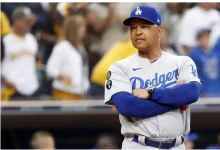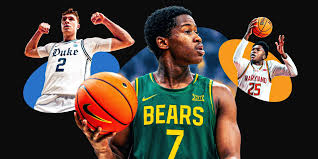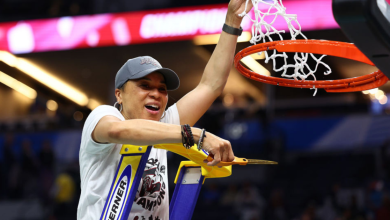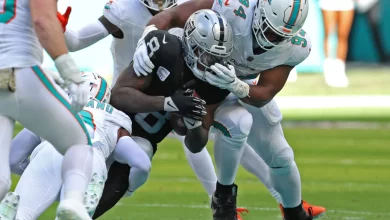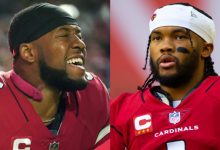NBA mock blockbuster trade: Lakers send Austin Reeves to Celtics in exchange for Jaylen Brown, shaking up both teams’ dynamics.
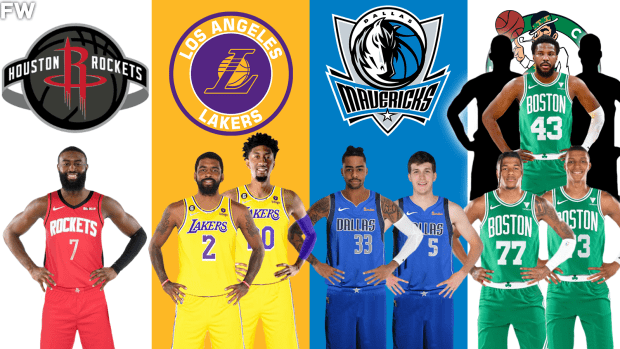
In the fast-paced world of NBA rumors and mock drafts, few hypothetical trades stir as much excitement and debate as a blockbuster deal involving star players from marquee franchises. One such trade buzzing among fans and analysts alike is a mock blockbuster where the Los Angeles Lakers send promising young guard Austin Reeves to the Boston Celtics in exchange for established All-Star Jaylen Brown.
This hypothetical trade would not only alter the trajectories of two of the NBA’s most storied franchises but also significantly impact the competitive landscape of the league’s Western and Eastern Conferences. Let’s dive deep into the details, motivations, and possible consequences of this eye-catching trade scenario.
Background: The Players Involved
Austin Reeves:
Austin Reeves, a talented 24-year-old guard, has emerged as one of the Lakers’ most promising young stars. Known for his scoring ability, playmaking, and toughness, Reeves has steadily improved his game since entering the NBA. While not yet an All-Star, Reeves has shown flashes of being a reliable two-way contributor with potential to develop into a key piece of a championship-contending roster.
His youth and potential make him a valuable asset, especially for teams like the Celtics looking to add promising talent and build for the future.
Jaylen Brown:
Jaylen Brown, 27, is an established All-Star and one of the Boston Celtics’ cornerstone players. Brown is known for his elite athleticism, defensive versatility, and improved offensive game, including his ability to score from beyond the arc and create his own shot. Over the years, Brown has evolved from a raw prospect into a polished two-way star, often regarded as one of the NBA’s best two-way wings.
Brown is a proven winner, with deep playoff experience and a reputation for rising to the occasion in big games. His contract, skills, and leadership make him a coveted asset.
The Trade Proposal: Why It Makes Sense for Both Teams
For the Lakers:
The Lakers, with LeBron James and Anthony Davis still anchoring their roster, are in a win-now mode. Adding an established star like Jaylen Brown provides them with an immediate boost in scoring, defense, and championship experience. Brown’s ability to defend multiple positions and shoot from outside complements the Lakers’ core perfectly, offering spacing and toughness around their stars.
Trading Austin Reeves, while painful given his potential, signals the Lakers’ urgency to maximize their championship window. Brown is a proven difference-maker who could elevate the team’s chances this season and beyond.
For the Celtics:
Boston, meanwhile, has a rising star in Jayson Tatum but faces questions about depth and cap flexibility. Acquiring Austin Reeves gives the Celtics a promising young guard who can grow alongside Tatum and help diversify their offensive options.
Reeves’ youth and affordability could offer the Celtics greater roster flexibility and room to maneuver in the future. Additionally, Boston might see value in injecting fresh energy and versatility into their backcourt, helping them remain competitive while managing their payroll.
Fit and Impact on Team Dynamics
Lakers’ New Look:
Integrating Jaylen Brown into the Lakers’ lineup would reshape their offensive and defensive schemes. Brown’s elite defense and three-point shooting would alleviate pressure on LeBron and Davis, allowing them to operate more freely in pick-and-roll situations.
Brown’s athleticism and ability to create plays off the dribble would help the Lakers attack different defenses more effectively, while his defensive prowess could counter the West’s elite wings.
The Lakers’ perimeter defense would improve, addressing a critical need from previous seasons when opposing wings often exploited mismatches.
Celtics’ Future Potential:
The Celtics would gain a promising scorer and playmaker in Austin Reeves, whose versatility can fit into various lineup combinations with Jayson Tatum and Marcus Smart (or his successors).
Reeves’ ability to handle the ball and shoot from distance complements Boston’s need for a more dynamic backcourt presence. While he lacks Brown’s star power and experience, his developmental upside could pay dividends over time.
This trade could signal a subtle shift for Boston toward youth and flexibility while maintaining competitiveness in the loaded Eastern Conference.
Financial and Contract Considerations
Jaylen Brown carries a sizable contract, reflecting his All-Star status and value. For the Lakers, taking on Brown’s salary means committing significant payroll resources, likely requiring other roster moves to maintain cap flexibility.
Austin Reeves, being younger and less established, has a more affordable contract, which could provide Boston with some financial breathing room.
Both teams would have to navigate the luxury tax implications carefully, but the trade could be structured to balance salaries under NBA rules.
Potential Challenges and Risks
For the Lakers:
The primary risk for the Lakers is losing a young, developing talent in Austin Reeves, who could blossom into a long-term star. There is also the challenge of integrating Brown’s style with the existing roster and managing egos and roles within a veteran-heavy lineup.
Injuries to key players like LeBron and Davis remain a concern, and the pressure to win immediately could backfire if team chemistry suffers.
For the Celtics:
Boston risks giving up a proven All-Star and consistent two-way presence in Brown. If Reeves fails to develop as hoped or fit within Boston’s system, the trade could set the Celtics back.
The Celtics would need to rely on other players stepping up to fill Brown’s void, a challenge given the league’s competitive landscape.
Historical Context and Comparisons
NBA history offers several examples of blockbuster trades involving young prospects for established stars. The success or failure of such moves often hinges on timing, fit, and subsequent development.
For instance, the Cleveland Cavaliers trading promising talent for Kevin Love in 2014 was a win-now move that helped assemble a championship team. Conversely, other trades have backfired when young players blossomed elsewhere.
The Lakers-Celtics trade scenario echoes this tension between competing priorities: immediate championship contention versus building for the future.
Fan and Analyst Reactions
Speculation around this mock trade has sparked lively debate among fans and analysts:
-
Lakers fans express excitement about acquiring an All-Star who can help LeBron and Davis win another title.
-
Celtics fans are cautiously optimistic about gaining a promising young guard but wary of losing Brown’s proven production.
-
Analysts praise the logic behind the deal but caution about risks related to chemistry and long-term balance.
Social media is abuzz with discussions, memes, and debates over who “wins” the trade.
What This Trade Means for the NBA Landscape
If executed, this trade would ripple across the league, affecting playoff projections and team strategies.
The Lakers would instantly become more formidable contenders in the West, potentially reshaping the balance of power with the Warriors, Nuggets, and other contenders.
The Celtics, by contrast, would signal a subtle rebuild or retooling while remaining competitive in the East, perhaps altering their approach in free agency and future drafts.
The mock blockbuster trade sending Austin Reeves to the Celtics for Jaylen Brown captures the essence of NBA team-building drama: balancing star power with potential, present success with future growth.
For the Lakers, acquiring Brown bolsters their championship hopes with a proven All-Star capable of making an immediate impact. For the Celtics, adding Reeves offers flexibility, youth, and a chance to develop a complementary piece alongside Jayson Tatum.
Yet, like all blockbuster trades, success depends on execution, chemistry, and sometimes a bit of luck. Fans of both teams will be watching closely, hoping their franchise emerges stronger from this high-stakes hypothetical deal.

